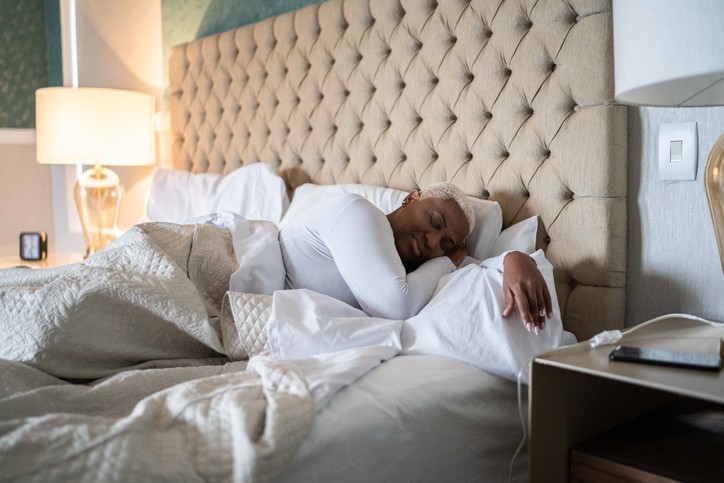
Healio: Sleep, diet among keys to preserving cognitive function during cancer survivorship
Up to 25% of cancer survivors report persistent symptoms of cognitive dysfunction, often called "chemo brain." But cancer-associated cognitive dysfunction can be a symptom of cancer itself or other treatments beyond chemotherapy.
“If we look at cognition in general over our lifetimes, a number of factors make us either more resilient or more vulnerable to cognitive impairment as we get older,” Rhonna Shatz, DO, University of Cincinnati adjunct associate professor, division director for behavioral neurology, the Bob and Sandy Heimann Endowed Chair in Research and Education in Alzheimer’s Disease in the UC College of Medicine and a UC Health physician, told Healio. “When someone has cancer, this is almost like an accelerant to any fire that is going on inside someone’s body.”
Shatz helped develop the University of Cincinnati Cancer Center Cognitive Clinic and spoke at a recent Survivorship Research Forum. The clinic provides assessment, treatment and monitoring of cognitive issues for people with cancer and cancer survivors, with assessments for sleep, exercise, nutrition and social support to optimize brain function.
“We try to think of all the ways in which the individual in front of us has preexisting risk factors, and the ways in which cancer and its treatments are impacting that,” Shatz said. “Then we figure out a very comprehensive plan for how we can help this person.”
Shatz said adequate and quality sleep is an important factor of brain health, and 97% of patients who are treated at the clinic have a sleep disorder.
“If these individuals also have issues with sleep and they can’t eliminate these excess inflammatory factors, it can cause a dip in thinking,” Shatz said. “We actually do see some cognitive changes before cancer treatment.”
Diet and exercise are also important considerations, Shatz said, and she recommends the Mediterranean-Diet Intervention for Neurodegenerative Delay (MIND) to cancer survivors. The MIND diet contains foods rich in vitamins, carotenoids and flavonoids, like berries, dark leafy greens and olive oil, that are thought to decrease oxidative stress and inflammation to the brain.
“What we’ve tried to convey is the fact that in the MIND guidelines, the foods are chosen specifically for anti-inflammatory activity,” Shatz said. “We walk people through the ways in which they can meet the requirements of the MIND guidelines.”
Featured photo at top of a woman sleeping. Photo/iStock/FG Trade.
Related Stories
Mural by UC grad honors U.S. military history
July 17, 2024
Local 12 highlighted a new mural by University of Cincinnati graduate and artist Brandon Hawkins that pays tribute to U.S. military history.
Social media fuels extreme political rhetoric
July 17, 2024
UC College of Arts and Sciences Professor Jeffrey Blevins tells Local 12 that online algorithms fuel political polarization on social media.
Camp aims to empower children, teens who stutter
July 17, 2024
A one-week, evidence-based program for children and teens who stutter at the University of Cincinnati will teach kids to communicate effectively, advocate for themselves and develop confidence about their communication abilities. Camp Dream. Speak. Live., which is coming to Cincinnati for the first time July 22-26, began in 2014 at the University of Texas at Austin. The Arthur M. Blank Center for Stuttering Education and Research at UT expects to serve more than 2,000 children at camps across the United States, Africa, Asia and Europe this year.
From intern to full-time: Recent Lighting Design grad joins Bandit Lites
July 16, 2024
Lighting & Sound America spotlights recent graduate Riley Rowan's new position at Bandit Lites, a full-service design, management and producer of live events and entertainment.
CCM alum Donald Lawrence to be inducted into Cincinnati Black Music Walk of Fame
July 16, 2024
UC College-Conservatory of Music alumnus Donald Lawrence is part of the 2024 class of Cincinnati Black Music Walk of Fame inductees. Located at the Banks in downtown Cincinnati, the induction ceremony on July 27 will feature a parade of stars and a free concert by the Zapp Band.
U.S. stroke survival is improving, but race still plays role
July 16, 2024
U.S. News & World Report, HealthDay and Real Health covered new research from the University of Cincinnati that found overall rates of long-term survival following stroke are improving, but Black individuals experience worse long-term outcomes compared to white individuals.
Collaborative pianist and vocal coach Kirill Kuzmin joins CCM’s faculty
July 16, 2024
UC College-Conservatory of Music Interim Dean Jonathan Kregor has announced the addition of Kirill Kuzmin to the college’s faculty of distinguished performing and media arts experts, researchers and educators. A Grammy-nominated collaborative pianist and vocal coach, Kuzmin begins his new role as Associate Professor of Opera/Vocal Coaching on Aug. 15, 2024.
My incredible first year at Cincinnati Law: Journey, reflections and highlights
July 16, 2024
Dean Haider Ala Hamoudi gives a progress report on his first year as dean of the College of Law.
Presidential challenge to UC: Join Ride Cincinnati to fight cancer
July 16, 2024
UC President Neville Pinto has again challenged every UC college and unit to send at least one rider to the September 14 Ride Cincinnati event to help fundraise for cancer research and cancer care. UC students ride free. Signup by July 31 for free UC-branded cycling jersey.
Pediatric ICU rates linked to housing quality, income, education
July 16, 2024
Healio highlighted research led by the University of Cincinnati and Cincinnati Children's Hospital's Carlie Myers that found a link between pediatric ICU admission rates and housing quality, household income and education.
